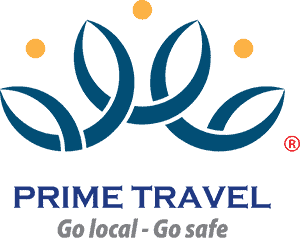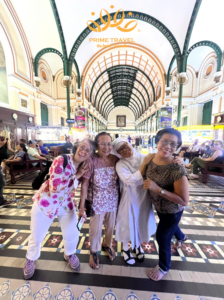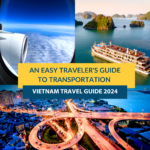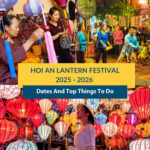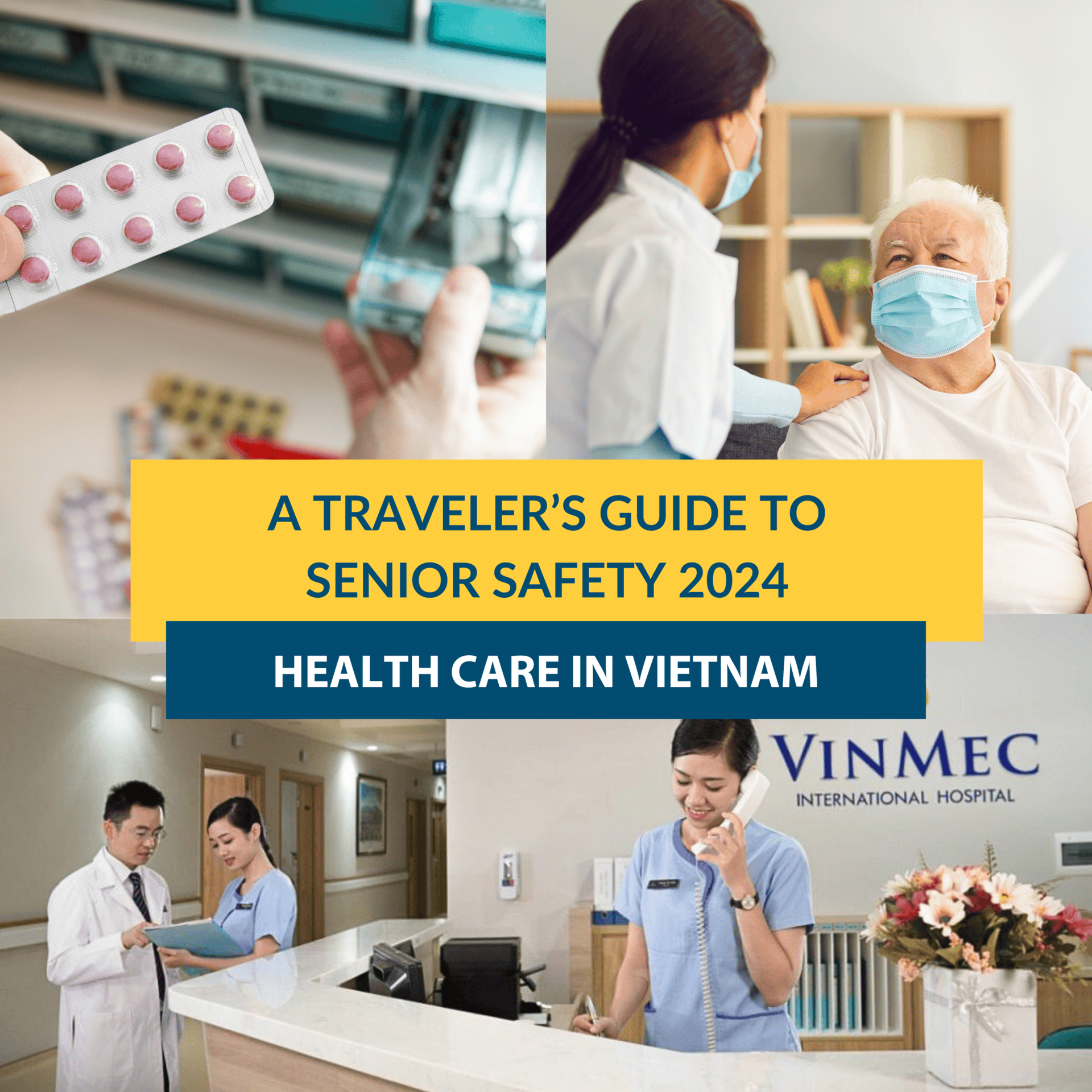
Healthcare in Vietnam: A Traveler’s Guide to Senior Safety 2024
When traveling to a new country, in addition to considering accommodations, transportation, and tourist attractions, one aspect that should not be overlooked is your health. This is especially important for first-time visitors to Vietnam or those planning to explore remote areas.
Understanding the healthcare in Vietnam is essential to ensure a safe and enjoyable trip. Having access to quality medical care will give you peace of mind while you explore the country. Prime Travel provides valuable resources, including information on local healthcare facilities and health tips, particularly for senior travelers, to ensure a smooth journey in Vietnam.
Overview of the Healthcare System in Vietnam
Vietnam has a wide network of healthcare facilities, with over 1,500 hospitals across the country. Around 80% of these are public hospitals, while approximately 15% are private. However, the majority of large, well-equipped hospitals are concentrated in major cities like Hanoi, Ho Chi Minh City, and Da Nang. For those in rural areas, healthcare may not be as accessible, so it’s advisable to plan ahead and locate nearby medical centers or clinics in case of emergencies.
Public hospitals
Central public hospitals, which are large, specialized institutions known for their advanced medical care, are highly regarded in Vietnam. Most of these hospitals have skilled doctors and fairly complete medical equipment. However, the facilities are a bit old since the hospitals have been operating for quite some time. Despite the aging infrastructure, they often experience overcrowding due to the high volume of patients from across the country seeking treatment. This is a common issue, as these hospitals are considered the best for complex medical cases.
For international travelers, public hospitals are generally not recommended. The overwhelming number of patients often results in lengthy wait times, which can take an entire morning or longer if visiting without an appointment or prior preparation. Also, most doctors and nurses primarily speak Vietnamese, which can create communication barriers.
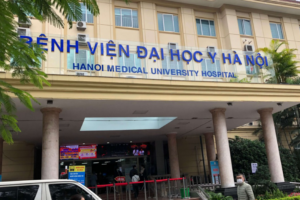
Healthcare in Vietnam: Hanoi Medical University Hospital (Source: Internet)
Private hospitals
Private hospitals, though fewer in number, offer modern and comfortable environments with advanced medical technology, making them a key part of the healthcare in Vietnam system.
Many have staff with some English proficiency, and some international hospitals even employ foreign doctors, which can be helpful for travelers. These hospitals attract skilled doctors from countries like South Korea, Japan, France, and the United States. Service quality is generally excellent, with personalized care and shorter wait times.
For international travelers, private hospitals are an ideal choice, as they offer the most reliable and comfortable healthcare options. However, it’s important to note that the cost of services at private hospitals is typically higher than at public hospitals.
Regarding health insurance, coverage depends on whether the hospital has a partnership with the traveler’s insurance provider. If so, the hospital may cover the costs; otherwise, the patient would need to pay out of pocket.
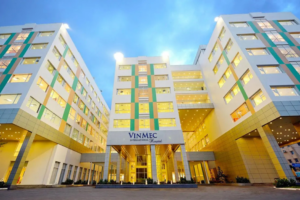
Healthcare in Vietnam: Vinmec International Hospital (Source: Internet)
| Name | Number of Branches | Addresses |
| Vinmec International Hospital | 9 |
|
| Hanoi French Hospital | 1 | No.1 Phuong Mai Street, Dong Da District, Hanoi. |
| FV Hospital | 1 | 6 Nguyen Luong Bang St. Saigon South, Dist.7, Ho Chi Minh. |
| Hanh Phuc International Hospital | 2 |
|
| Family Medical Practice | 3 |
|
| Viet Duc | 1 | 40 Trang Thi Street, Hoan Kiem District, Hanoi. |
| International SOS | 2 |
|
| Raffles Medical Clinic | 3 |
|
| American International Hospital | 1 | 199 Nguyen Hoang Street, An Phu Ward, Thu Duc, Ho Chi Minh. |
| Hue Central Hospital | 1 | 16 Le Loi Street, Hue. |
| Sai Gon Hoi An Hospital | 1 | 06 Phan Dinh Phung Street, Tan An Ward, Hoi An. |
Emergency Medical Services
Emergency medical services for healthcare in Vietnam can be reached by dialing 115. The response times of ambulances can vary depending on the location. In larger cities like Hanoi and Ho Chi Minh City, ambulances generally respond more quickly, while in rural areas, the response time may be longer.
Most ambulance crews speak Vietnamese, and the medical equipment on ambulances includes essential tools for emergency first aid, such as blood pressure monitors, stethoscopes, thermometers, medical bandages, flashlights, and blankets. These basic yet important items help ensure that emergency personnel are prepared for nearly any situation.
Private hospital ambulances tend to be better equipped, and in some cases, the staff is often more proficient in English. However, it’s important to note that ambulance services from private hospitals can be more expensive than public options. Always check with your healthcare provider to understand the service details and costs involved.
Pharmacy System
Pharmacies “Nha Thuoc” are widely distributed, particularly main cities, making it convenient for patients who need immediate medication or medical supplies.
It’s important to be cautious when purchasing medications, as counterfeit and expired drugs can sometimes be an issue in the market. To avoid this, it’s recommended to purchase medicines from pharmacies in hospitals or reputable pharmacy chains such Long Chau, Pharmacity, and Medigo. Many of these pharmacies operate 24/7, though not all branches stay open all night, typically closing at around 11 PM.
Vietnam has restrictions on medicines it classifies as ‘addictive’ or ‘psychotropic’. These include medicine used to treat of addiction, anxiety, depression, insomnia and other conditions.
It is illegal to have more than the amount prescribed by a doctor for 7 days (addictive medicine) or 10 days (psychotropic medicine). You should carry the prescription with your medication and a letter from your doctor stating how much of the medication you need during your trip.
The letter can be in English and should:
- include your name and age
- list the medicine name, volume and dosage
- include the doctor’s signature and address
Read more>>> Medical & Health
Common Health Issues for Travelers in Vietnam
Vietnam’s tropical climate and rich local cuisine can sometimes lead to health issues for travelers, especially those who are not accustomed to the environment. Below are some of the most common health issues:
Allergies
Vietnam’s diverse environment, including pollen, dust, and pollution, can trigger allergies, especially in urban areas like Hanoi and Ho Chi Minh City. Common symptoms include: sneezing, itchy eyes, runny nose, congestion, and skin rashes.
Travelers with food allergies should be cautious, as certain dishes may contain allergens like peanuts, seafood, or gluten. Always inform restaurant staff about your allergies, and if you’re booking a tour, notify your tour operator or guide so they can accommodate your needs.
Solo travelers can use translation apps to communicate their allergies or learn key phrases in Vietnamese to ensure their safety. If you have a history of severe allergies, bring your prescribed medications and keep them easily accessible in case of an emergency.
You can learn the following key Vietnamese phrases to inform others, such as restaurant owners, about your food allergies:
- “Khong an dau phong” or “Di ung dau phong”. (I have a peanut allergy.)
- “Khong an hai san” or “Di ung hai san”. (I have a seafood allergy.)
- “Khong an trung” or “Di ung trung”. (I have an egg allergy.)
- “Khong an lua mi” or “Di ung lua mi”. (I have a wheat allergy.)
- “Khong uong sua” or “Di ung sua”. (I have a milk allergy.)
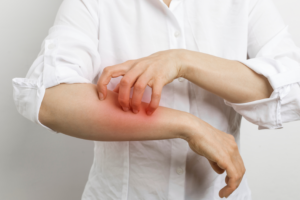
Common Health Issues: Allergies (Source: Internet)
Food Problems
While Vietnamese cuisine is flavorful, it can sometimes lead to stomach issues such as food poisoning, diarrhea, abdominal pain, or allergic reactions, especially for those unfamiliar with local ingredients.
Common causes include unsanitary food preparation, consumption of undercooked or spoiled food, and exposure to parasites in raw dishes. To minimize the risk, always eat at reputable restaurants that maintain high hygiene standards, and avoid street food that appears unhygienic.
Stick to bottled water and avoid drinking tap water or ice in rural areas or places where you feel the hygiene may not be guaranteed. Be cautious when trying unfamiliar foods, especially wild animals, as they may carry risks. If you’re unsure about a dish, don’t try to eat it.
Read more>>> Vietnam Food Safety: The Ultimate Guide to Street Food for Travelers in 2024
Sunstroke
Vietnam’s hot and humid climate, particularly during the summer months, increases the risk of sunstroke, especially in the central and southern regions. Symptoms of sunstroke include dizziness, nausea, rapid heartbeat, flushed skin, confusion, and sometimes loss of consciousness. If you experience these symptoms, it’s important to move to a cooler place, lie down, and drink plenty of water to rehydrate. Applying a cold compress to the forehead or neck can help cool down the body.
To prevent sunstroke, wear a wide-brimmed hat, use a high-SPF sunscreen, and avoid direct sunlight during the hottest parts of the day, typically from 11 AM to 4 PM. Also, drink plenty of water regularly, and take breaks in shaded areas while exploring outdoor attractions.
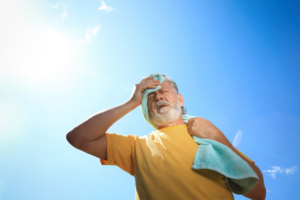
Common Health Issues: Sunstroke (Source: Internet)
Insect Bites (Dengue Fever)
Insects, particularly mosquitoes, are prevalent in Vietnam’s tropical climate, and can transmit diseases like dengue fever. Dengue symptoms typically include high fever, severe headache, pain behind the eyes, joint and muscle pain, nausea, and skin rashes.
The risk is higher in both urban and rural areas, especially during the rainy season when standing water creates ideal breeding grounds for mosquitoes. To protect yourself, wear insect repellent containing DEET, long-sleeved clothing, and use mosquito nets or screens when sleeping, particularly in areas like Hanoi, Ho Chi Minh City, and rural villages.
Avoid areas with stagnant water, such as puddles or uncovered water containers, as they attract mosquitoes. If bitten and symptoms of dengue fever appear, seek medical attention immediately for diagnosis and treatment.
Rabies
Rabies is a rare but serious viral infection that is spread through the bite or scratch of an infected animal, commonly dogs or bats. The symptoms of rabies in humans include fever, headache, confusion, aggression, hallucinations, and difficulty swallowing, which can eventually lead to death if untreated.
While rabies is not widespread, it is important to be cautious around stray animals, particularly in rural and less-developed areas. If bitten or scratched by any animal, immediately wash the wound with soap and water and seek urgent medical attention to receive a rabies vaccination or post-exposure prophylaxis (PEP).
Avoid contact with stray or wild animals and be extra cautious in rural areas where these animals are more common. Always report bites to local health authorities for proper care and follow-up.
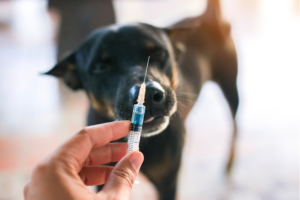
Common Health Issues: Rabies (Source: Internet)
Health Tips for Traveling in Vietnam
Before You Travel
General Health Check-up
Before you travel to Vietnam or any destination, it’s essential to undergo a general health check-up. Consulting with your healthcare provider ensures that you are in optimal health for travel. A check-up can identify any underlying health issues, manage chronic conditions, and confirm that you’re physically ready for the challenges of travel.
This is especially important for travelers with pre-existing conditions, such as diabetes or heart disease, as they may require special attention during the trip. It also helps to address common health issues, which can affect travelers during their journey.
Read more>>> Tips to travel Vietnam for senior travelers [ Update 2024 ]
Recommended Vaccines for Southeast Asia
Vaccinations are crucial when traveling to Southeast Asia. For Vietnam, the Centers for Disease Control and Prevention (CDC) recommends several key vaccines to help protect you from infectious diseases commonly found in the region:
- Hepatitis A and B
- Typhoid fever
- Japanese encephalitis
- Rabies
It is also advisable for adults to get a booster for diphtheria and tetanus (DTaP), and vaccines for chickenpox, mumps, rubella, and measles, particularly for travelers who have not received them in the past.

Health Tips: Vaccines for Southeast Asia (Source: Internet)
Personal Medications
When preparing for travel, it’s important to pack any medications you may need during your trip. Ensure that you carry enough prescription medicine for the entire duration of your stay, along with a copy of your doctor’s prescription.
This is one of the health tips you can’t overlook. It’s also wise to pack over-the-counter medications for common travel ailments such as headaches, digestive issues, or allergies. Be sure to label all medications clearly to avoid confusion.
A basic first-aid kit, including items like bandages, antiseptics, and insect repellent, can also be very useful during your travels.
Travel Insurance
Travel insurance with medical coverage is a must, particularly if you’re traveling abroad for an extended period. Ensure that your policy includes emergency medical evacuation, which can be necessary in the event of serious illness or injury.
While Vietnam has decent healthcare facilities in major cities, in the case of severe medical emergencies, being evacuated to a more specialized facility may be required. Be sure to thoroughly read your insurance policy to confirm it covers the specific needs you may have.
Read more>>> Vietnam Travel Insurance: The best guide before you go
Research Health Risks in Vietnam
In addition to the recommended vaccinations, it’s crucial to research health risks that may be prevalent in the area you’re visiting. Southeast Asia is known for certain infectious diseases, such as dengue fever, malaria, and chikungunya, which are transmitted by mosquitoes. It’s important to check if any particular region of Vietnam is experiencing an outbreak of these diseases.
Also, look into any seasonal illnesses, like influenza or COVID-19, which may affect your health during your trip. Local health advisories and travel forums can provide up-to-date information.

Health Tips: Covid-19 Pandemic (Source: Internet)
Pre-Travel Health Preparation
Before embarking on your trip, focus on maintaining your health and fitness.
Prioritize a balanced diet and stay hydrated, especially in the days leading up to your departure. Avoid intense physical activity or stressful situations to ensure your body is well-rested. Try to get plenty of sleep to ensure you’re in top condition when you begin your travels. Additionally, refrain from consuming alcohol or other substances that could weaken your immune system before your trip.
Proper preparation will help you make the most of your time in Vietnam and prevent common health issues from derailing your adventure.
During Your Trip
Stay Hydrated
Vietnam has a tropical climate, with hot and humid weather throughout much of the year. Due to the high temperatures and humidity, your body can quickly drain energy and fluids, making it essential to stay hydrated. One of the most important health tips when traveling in Vietnam is to drink only bottled water to avoid potential stomach issues, as tap water may not be safe for drinking. Also, avoid consuming ice unless you’re certain it has been made from filtered or bottled water.
Be Cautious with Food Stall
Food is one of the joys of traveling, but it’s important to be careful with what you eat, especially when trying local street food. If you’re not careful, you might experience stomach discomfort, which is one of the common health issues in Vietnam.
Avoid consuming raw or undercooked foods. Stick to freshly cooked meals that are served hot, and wash your hands thoroughly before eating to minimize the risk of foodborne illnesses. If you’re unsure about certain foods, it’s always safer to ask the locals or your tour guide for recommendations, or simply avoid it altogether.
Rest When Needed
Traveling can be physically demanding, especially when you’re exploring new destinations and activities. Be sure to listen to your body and rest when needed. Adequate sleep and downtime will help you maintain energy and avoid exhaustion. If you’re feeling tired, take a break and allow yourself to recharge. This will ensure that you remain healthy and energized for the rest of your trip.
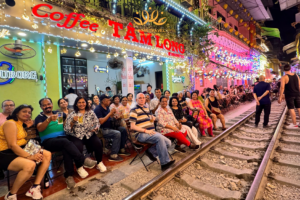
Health Tips: Flexible Package Tour in Vietnam (Source: Prime Travel)
Don’t Overexert Yourself
While Vietnam offers a wealth of exciting activities, it’s important not to push your body beyond its limits. If you’re not feeling well or if an activity seems too physically demanding, don’t hesitate to skip it.
There are plenty of other ways to enjoy your trip without overexerting yourself. Whether it’s a long hike or a high-energy tour, it’s always better to opt for a more suitable activity that fits your current condition and energy levels.
Pack Appropriately for Each Activity
Different regions in Vietnam have varying climates, so it’s essential to pack appropriately for the activities you’ll be doing. To pack wisely, you should first research the weather and activities in the area you plan to visit. You can check weather forecasts online or ask friends, family, or those who have traveled to Vietnam for advice. If you’re booking a tour with an operator, you can directly ask them for packing suggestions, as they’ll provide the specific information you need.
For example, if you’re planning to visit Sapa, pack warm clothing as temperatures can drop significantly, even during the summer months. Similarly, if you’re heading to the beach, lightweight and breathable clothing is a must. Ensure you have the right gear for your specific tours or excursions, such as sturdy shoes for trekking or rain gear for unpredictable weather.
Read more>>>> Packing List Vietnam Holiday
Seek Help If You Need It
If you experience any health issues during your trip, don’t hesitate to ask for help. Whether it’s from your tour guide, hotel staff, or locals, Vietnamese people are known for their warmth and hospitality, and they will assist you whenever you need it.
If you’re feeling unwell or have any medical concerns, reach out immediately. Your tour guide will be able to direct you to the nearest pharmacy or medical center, and hotel staff are usually well-equipped to help with basic healthcare needs. Always remember, you’re never alone – there’s always someone ready to support you.
After Your Trip
Health Check-up After Your Trip
After returning from Vietnam, it’s important to prioritize your health. If you experience any symptoms such as fever, rashes, digestive issues, or fatigue, don’t hesitate to seek medical attention. Some illnesses, such as malaria or dengue fever, may have delayed symptoms, and it’s crucial to address them promptly. If you had any health concerns during your trip, even if they seemed minor at the time, it’s a good idea to schedule a visit to your healthcare provider for a full check-up. Early detection can help prevent any complications and ensure you recover fully from any health issues.
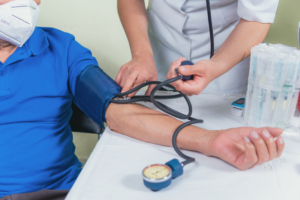
Health Tips: Health Check-up (Source: Internet)
Energy Recovery After Travel
Returning from an international trip can often leave you feeling exhausted, especially if you’ve been adjusting to a new time zone or engaging in high-energy activities. To recover your energy and restore balance to your body, make sure to give yourself time to rest.
Take time to relax and recharge your body—consider doing activities like stretching, light walking, or practicing relaxation techniques. Skin care is another key aspect of recovery, as travel, changes in climate, and exposure to the sun can dehydrate your skin. Use a good moisturizer and sunscreen to protect your skin during this recovery phase.
- Prioritize quality sleep to allow your body to fully recover.
- Eating nutritious, balanced meals to replenish lost energy.
- Drink plenty of water to stay hydrated.
- Avoid alcohol or caffeine, as they can disrupt your sleep.
- Take time to relax and do some activities like stretching, light walking, or relaxation techniques.
- Skin care after traveling by using a good moisturizer and sunscreen to restore hydration and protect against further damage.
Jet Lag
Jet lag is one of the common health issues after long-haul flights, especially when traveling across time zones. It can leave you feeling disoriented, tired, or unable to sleep at the right times. To minimize the effects of jet lag, try to gradually adjust your sleep schedule a few days before your trip, if possible.
Upon arrival, expose yourself to natural sunlight during the day and avoid napping if you’re trying to adjust to the new time zone. Some small health tips to stay hydrated and avoid heavy meals or alcohol before bedtime. Give yourself time to adjust, and don’t rush—your body will eventually align with the new time zone.
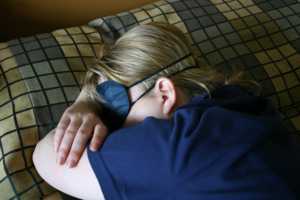
Health Tips: Jet lag (Source: Internet)
Checking Food and Souvenirs from Vietnam
If you’ve brought food items, spices, or souvenirs from Vietnam, make sure to check them carefully when you return. Always verify the expiration dates of any food items or snacks you plan to keep. For packaged goods, ensure they are sealed properly and haven’t been damaged during transit. Any perishable items, such as dried meats or local delicacies must be stored correctly or disposed of if they are past their shelf life. Additionally, be mindful of local regulations regarding bringing food or plant-based items into your country—certain food items may be restricted due to health or safety concerns.
Read more>>> Top 5 best Vietnamese traditional food that you must try
Vietnam for Senior Citizens: Healthcare Considerations
Traveling to Vietnam for senior citizens can be a wonderful experience, offering rich cultural experiences, breathtaking scenery, and delicious food. However, to ensure a safe and enjoyable trip, seniors need to consider some important health tips.
Pre-existing Conditions
Seniors with pre-existing medical conditions should take special care when traveling. It’s essential to consult with a healthcare provider before the trip to ensure that any existing conditions are well-managed. For instance, those with chronic heart issues, diabetes, or respiratory problems should review their treatment plans and discuss potential travel-related risks. Carrying a comprehensive list of medications and medical records is crucial, along with ensuring that prescriptions are up-to-date. Some medications may not be readily available in Vietnam, particularly in rural areas, so bringing a sufficient supply for the duration of the trip is important.
Furthermore, it’s important to consider whether flying is a safe option for seniors with certain medical conditions. Some elderly individuals may have health issues that make air travel risky:
- Seniors who have recently had surgery
- Blood and neurological disorders
- Breathing problems like asthma or lung diseases
- Heart problems such as heart attack, chest pain, heart failure, or valve issues
- Ear infections or sinus problems – seniors should avoid flying
- Seniors with weak health, especially if their doctor advises against flying
Assistance Tools
Traveling in a foreign country can be challenging for seniors, especially if they have mobility issues or need special equipment. Bringing along necessary mobility aids, such as walkers, canes, or whheelchairs if needed. It’s also advisable to research accessible accommodations and transportation options before departure.
Many major cities in Vietnam have hotels and taxis that cater to seniors, but rural areas may lack such conveniences. Therefore, planning ahead to ensure that mobility aids will be available during the trip is important. Some guided tours may also provide specific support services for seniors who require additional assistance, making their experience more enjoyable and stress-free.
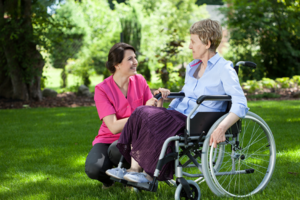
Vietnam for Senior citizens: Provide assitance tools for seniors (Source: Internet)
Tailoring the Tour for Seniors
When planning a trip to Vietnam for senior, it’s important to tailor the tour to the specific needs. Opting for a slower-paced itinerary with shorter travel distances and fewer activities per day is advisable to prevent exhaustion. It’s also worth considering specialized senior-friendly tours that focus on leisurely sightseeing and cultural experiences.
These tours often include easier-to-navigate destinations and accommodations with senior-friendly amenities. Seniors should avoid overly adventurous activities like long hikes or strenuous excursions unless they are physically fit and prepared. Customizing the travel experience ensures that the journey remains enjoyable without placing undue stress on their health.
Read more>>> Vietnam package tour from Philipines – How to Plan Your Dream Trip
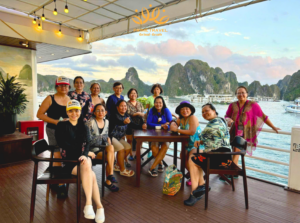
Vietnam for Senior citizens: Seniors Tour with Prime Travel (Source: Prime Travel)
Travel Companion
Having a travel companion is highly recommended for seniors, particularly for those with health concerns. A companion can assist in case of medical emergencies, help with navigation, and provide emotional support during the trip. This is especially true for those with chronic health conditions, as having someone familiar nearby can make it easier to manage any potential health issues.
In addition to providing practical help, a companion can help reduce the stress of travel, which can be overwhelming for some seniors. Ideally, travel companions should be family members or close relatives, as they are more familiar with the senior’s needs and can offer the best emotional and practical support.
Travel Insurance for Seniors
Having comprehensive travel insurance is a must for senior citizens, especially for those with pre-existing medical conditions. Seniors are more prone to health issues during travel, which makes travel insurance even more important.
It can help cover unexpected medical treatments, including hospital stays, medication, or emergency evacuations. They should look for travel insurance that specifically caters to their age group and health status, as some standard policies may not offer adequate coverage for older travelers.
Seniors are advised to purchase medical travel insurance before visiting Southeast Asia to protect their interests in case of injury or health problems. Without proper insurance, hospital costs can be quite expensive, especially in a foreign country. Before purchasing a policy, seniors should read the terms carefully and ensure that the coverage includes any medical treatments they might need during the trip.
Seniors Tours with Prime Travel
FAQs about Healthcare in Vietnam
Can I use my international health insurance in Vietnam?
Yes, many international health insurance providers have agreements with private hospitals worldwide, including those in Vietnam. It’s a good idea to confirm with your insurance provider beforehand whether it covers medical expenses in Vietnam,particularly for common health issues that seniors may experience, such as chronic conditions, respiratory issues, or heart disease.
Also, ask whether any additional paperwork is required for treatment of these conditions, to avoid any surprises during your trip. This preparation ensures a smooth process in case medical assistance is needed during your stay in Vietnam.
Where can I find English-speaking doctors in Vietnam?
Many private hospitals and clinics in major cities like Hanoi and Ho Chi Minh City offer quality healthcare in Vietnam with English-speaking doctors. Some of these hospitals even employ foreign doctors who can speak both English and French, making communication easier for international patients. It’s important to note that service fees at these private hospitals tend to be higher compared to public facilities.
Here are some well-known international hospitals in Vietnam where you can find English-speaking doctors:
- Vinmec International Hospital
- Family Medical Practice
- FV Hospital
- Hoan My Medical Corporation
Are over-the-counter medications easily available in Vietnam?
Yes, over-the-counter medications are readily available at pharmacies throughout Vietnam, especially in urban areas. Medications for common health issues like pain relievers, antihistamines, and digestive aids can be found in most pharmacies.
It’s important to note that certain medications, such as basic painkillers, cold medicine, or vitamins, can be purchased without a prescription. However, stronger medications, including antibiotics, narcotics, or medications for chronic conditions, typically require a doctor’s prescription. Be sure to check with the pharmacist if you’re unsure about the medication’s availability or whether a prescription is needed.

Healthcare in Vietnam: Pharmacity (Source: Prime Travel)
Is it safe to eat traditional Vietnamese dishes if I have a sensitive stomach?
Traditional Vietnamese dishes are generally safe to eat, but if you have a sensitive stomach, it’s best to start with milder options. Stick to cooked food, avoid raw dishes like salads, and always drink bottled water to avoid stomach issues.
It’s a good idea to limit eating street food, especially from vendors where hygiene standards may not be guaranteed. While street food can be delicious, it’s important to assess the cleanliness of the food preparation area before making a purchase. These are useful health tips for travelers to ensure a safe dining experience in Vietnam.
Conclusion
Overall, Vietnam is a safe destination for travelers, with a healthcare system that is steadily improving. Major cities have well-equipped hospitals, and there are many skilled doctors, including those who speak English. By following basic health tips, staying prepared for common health issues, and knowing where to seek medical help, you can focus on enjoying your adventure. For senior travelers, Prime Travel offers tailored solutions to ensure a safe, comfortable, and enjoyable stay. No matter your age or health status, with the right preparation and awareness of healthcare in Vietnam, you can enjoy a worry-free vacation.
Read more>>>
